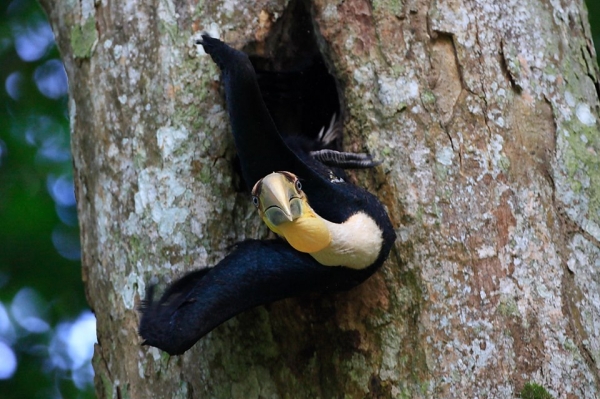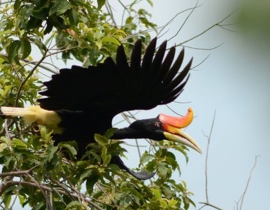Posted October 28, 2019 in Asia

Action for the Wild began supporting the Hornbill Research Foundation in 2002. Every year, we adopt family groups of hornbills to assist with their study and protection in three main sites in Thailand. The project’s aims are to enhance knowledge, promote awareness, and change behaviour to aid hornbill conservation, increase the population of hornbills, and increase the number of trees replanted in proportion to the increased number of hornbills.
Across the study sites last year, there were 373 available nest trees, where 182 nest cavities were used and 217 chicks successfully fledged. Of these nests, some are natural, but one of the project’s main activities is to create artificial nest cavities.
The use of artificial nests can increase growth rates of hornbill chicks in the wild areas where few large trees containing natural cavities remain. In 2018, 31 artificial nests were in existence, made from camouflaged fibreglass or wine barrels. Seven artificial nest cavities were used and eleven chicks were successfully fledged. Only the great and oriental-pied hornbills were found to use the artificial nests, while the rhinoceros, helmeted, and bushy-crested hornbills only inspected these nests out of interest, but never used them.
The use of artificial nests for hornbill breeding purposes is necessary because natural tree cavities usually occur in old trees. These large and old trees can fall down as a result of storms and are susceptible to being cut down through illegal logging. Moreover, the natural process of cavity creation is slow, complex, and not always suitable for hornbills. Therefore, artificial nests will be very useful for hornbill conservation.
Collaboration with the local community is also key to this project. In addition to employment, the project also works with conflict issues. In one community, hornbills had nested and destroyed the community orchards. The community leaders contacted the Hornbill Research Foundation to look into artificial nest cavity implementation in their orchards to solve these issues.
Action for the Wild currently supports three hornbill nests. In 2018, our helmeted hornbill and white crowned hornbill families were not successful. The female helmeted hornbill did remain within the nest for 102 days, but sadly the feather remains of the chick were found under the nest tree. Our rhinoceros hornbill pair were however successful. They utilised a nest tree first found in 2014, in which they have fledged four chicks previously between 2015 and 2018. They successfully bred one chick in 2018 over a 113 day period from the female sealing herself in the nest to the chick exiting the nest. The nest guardian, Mr Ruslan Jaroo, observed the nest site for 407 hours over 68 days, watching the male hornbill visiting and feeding every 1-3 hours.



